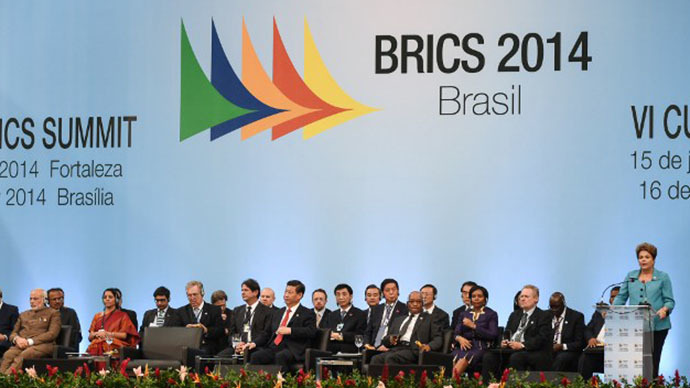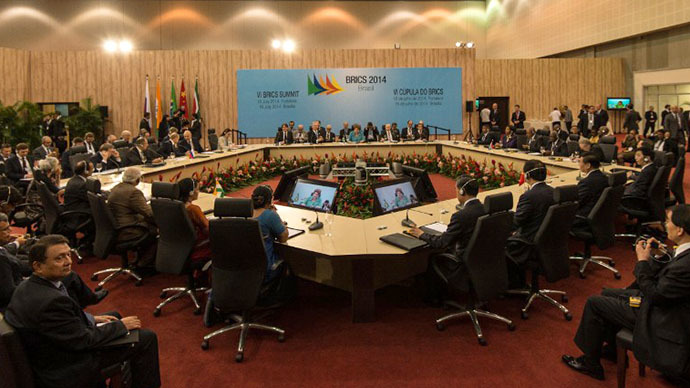Listen to the sound of the Global South

The BRICS summit in northeast Brazil has already made history for one key reason; the creation of the New Development Bank.
Call it the Global South antidote to that structural adjustment racket, the IMF. Over and over again, BRICS member nations and others have insisted on an institutional IMF reform that would recognize the economic weight of the Global South. Reform packages have been languishing in the US Congress since 2010. And once again they were blocked last April.
The New Development Bank will be way more democratic than the US/EU-controlled IMF. Look at the funding; a flat $10 billion contribution by each member country. This means, sooner or later, that other developing nations will also join. I have called it casino capitalism versus a productive capitalism model.
The summit agenda was humongous; the BRICS discussed trade, sustainable development strategies, macroeconomic policy, energy, finance, terrorism, climate change, regional security, drug smuggling, transnational crime, the industrialization of Africa. The BRICS are already advancing a slew of strategic multilateral projects in terms of setting up an alternative network infrastructure; for instance, the BRICS cable, currently being laid from Vladivostok to Shantou, Chennai, Cape Town and Fortaleza (where the summit took place). The BRICS cable is all about IT security, technology transfer, commodity turnover – and facilitating financial operations. Crucially, the cable bypasses the US.
On the second day of the summit, the five BRICS leaders spent four and a half hours at a round table with leaders of Unasur, the Union of South American Nations. There they were - Argentina’s Kirchner, Chile’s Bachelet, Colombia’s Santos, Bolivia’s Evo Morales, Ecuador’s Correa, Uruguay’s Pepe Mujica, Venezuela’s Maduro, Peru’s Umala, among others. That was the Global South in action; a substantial chunk of the real “international community” discussing production, investment, integration – not sanctions and bombs.

They talked myriad possibilities of BRICS investment in infrastructure – and integration - projects all across Latin America. For instance, as Chinese President Xi Jinping suggested, the perennially dreamed railway from the Pacific Ocean in Peru to the Atlantic in Brazil. A trilateral Brazil-Peru-China working group was set to plan, design, build and operate the transcontinental rail.
Russia shared its experience on dealing with money laundering and transnational cross-border crime. On security, Russia and China shared the synergy between the BRICS and the Shanghai Cooperation Organization (SCO) which binds Russia and China into a common security policy with Central Asia.
They talked about multiple strategies to bypass the Orwellian/Panopticon complex. And they talked about slowly implementing a multilateral, multipolar world.
From Brasilia to Brussels
In a nutshell, Putin and Xi played chess in Obama’s “backyard”, while the Yes We Can cipher was too busy playing with – what else - more sanctions.
Here is the common BRICS voice on sanctions; “We condemn unilateral military interventions and economic sanctions in violation of international law and universally recognized norms of international relations. Bearing this in mind, we emphasize the unique importance of the indivisible nature of security, and that no State should strengthen its security at the expense of the security of others.”
As the BRICS and Unasur talked cooperation and integration in Brasilia, in Brussels, France, Germany and Italy were the key EU members who refused to follow Washington and impose “sectorial trade and economic sanctions” on Russia. Still, the divided EU could not but end up singing to His Master’s Voice (US sanctions do wonders to promote the Transatlantic Trade Partnership, the multibillion dollar “free” trade still resisted by many within the EU.)
Thus the European Investment Bank and the European Bank for
Reconstruction and Development (EBRD) will block new projects in
Russia, and the European Commission will also suspend most of the
grants and loans it set aside for Russia.
The White House, of course, remains in a mean and vindictive
class all by itself. So here are more sanctions on Rosneft,
Gazprombank, Novatek, and state economic development bank VEB,
plus a rash of others on eight state-owned defense firms, Russian
government officials, an oil shipping facility in Crimea, and
federalists in Donetsk and Luhansk in Eastern Ukraine. The
proverbially anonymous “US officials” were on hand to pronounce
these sanctions would “restrict” Russia’s access to
“US debt markets.”

Now compare it to the BRICS’s unified voice on Ukraine, pushing for “a comprehensive dialogue, the de-escalation of the conflict and restraint from all the actors involved, with a view to finding a peaceful political solution, in full compliance with the UN Charter.”
Alexei Pushkov, Chairman of the Russian State Duma Committee on International Affairs, had pretty well defined, even before the summit, what the BRICS are for; “When it is said in the West that there is a kind of world community, which condemns us, they mean 28 NATO member states and the EU. However, this is not the world, but the West, the Euro-Atlantic community. And it is, with all its weight, not all of the world community, but only part of it.”
So not only this is the BRICS against the Washington consensus; it’s also the BRICS against the Western sanctions “model”. And the superimposed messages coming out from Fortaleza are crystal clear; the West’s monopoly on setting the global agenda is over.
Take also the BRICS’s unified voice on Israel/Palestine; they support “a contiguous and economically viable Palestinian State existing side by side in peace with Israel, within mutually agreed and internationally recognized borders based on the 4 June 1967 lines, with East Jerusalem as its capital”. They also “oppose the continuous construction and expansion of settlements in the Occupied Palestinian Territories by the Israeli Government, which violates international law, gravely undermines peace efforts and threatens the viability of the two-State solution.”
Israel, of course, is not listening. They’d rather go on with
their slow motion ethnic cleansing of Gaza.
After all, former bouncer turned truculent Foreign Minister Avigdor Lieberman told the Knesset, “the operation must end with the IDF controlling the entire Gaza strip.”
The BRICS, at the insistence of Russia and China, even introduced an updated draft treaty on the need to prevent the weaponization of outer space – as in Star Wars, an essential part of the Pentagon’s Full Spectrum Dominance doctrine. Guess who has always voted against it at the UN; Tel Aviv and Washington.
So the choice presented to the Global South is very simple, really. Pick your model; one is characterized by integration, cooperation, mutual respect. The other orders you to bow to His Master’s Voice; if you disobey, the model sanctions you to death, targets your energy industry, your access to financial markets, your wellbeing and, pushed to the limit, bombs you back to medieval times.
The statements, views and opinions expressed in this column are solely those of the author and do not necessarily represent those of RT.
The statements, views and opinions expressed in this column are solely those of the author and do not necessarily represent those of RT.













